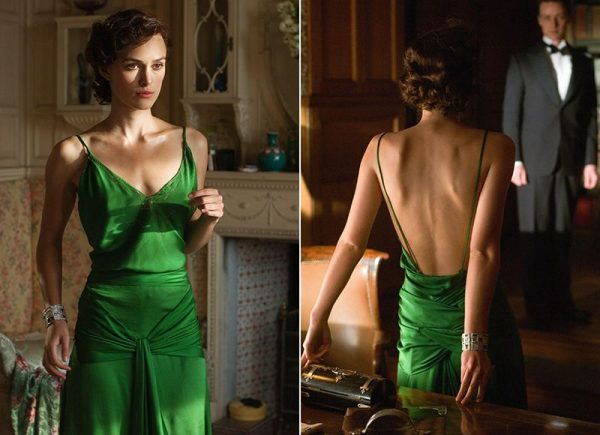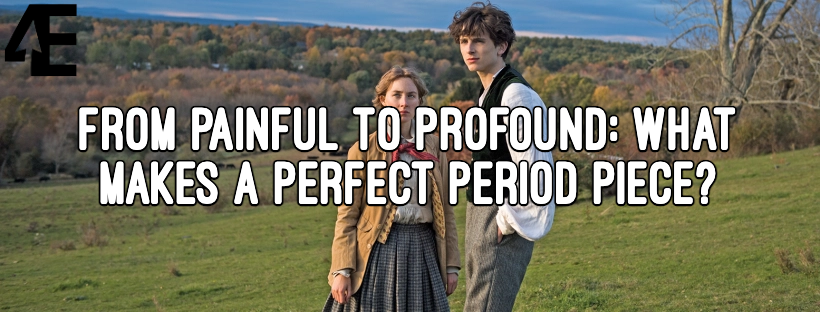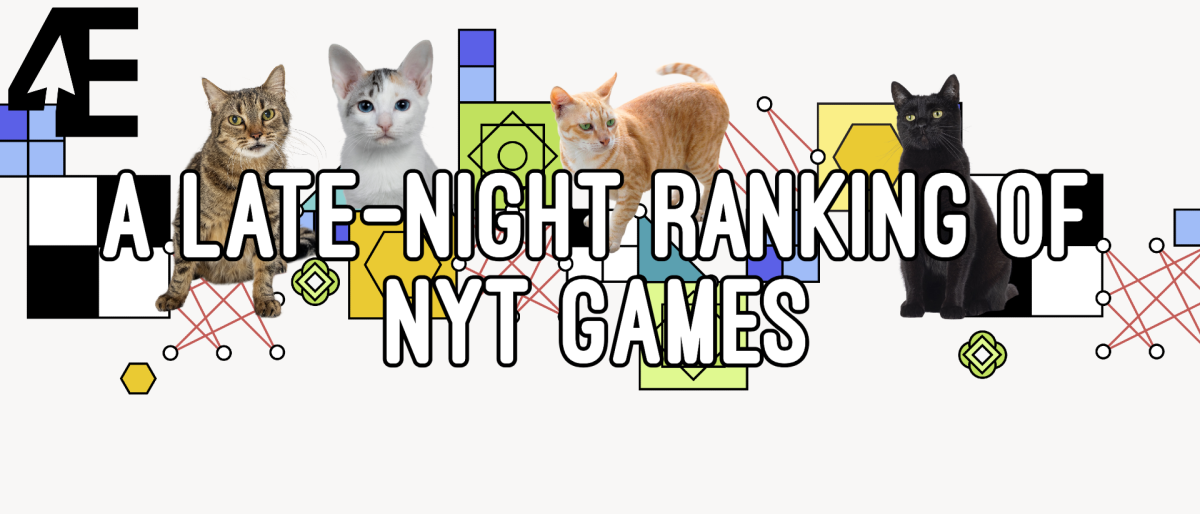Warning: Hot Takes & Spoilers Ahead!
From the most genuine place of my being, I try to live my life with an open mind. I attempt to avoid cynicism. I even strive to have some level of appreciation for things I do not necessarily enjoy. But as a history major and a lover of literature, period pieces — definition to be clarified, stay tuned — either turn me into an obsessed admirer… or a ruthless hater.
While it is true that I grew up as somewhat of a history buff, I must clarify that I never used to be this critical of historical films and literature. As a child, I was a glutton for any seemingly historical film, even if the movie itself wasn’t the greatest piece of cinema the world had ever seen. However, this all changed in 2020 when I watched Greta Gerwig’s “Little Women” for the first time. That movie made me obsessed with how historical social dynamics can be interpreted by filmmakers and adapted on the screen in a way that transcends simple historical fiction.
As a 16-year-old during the pandemic, I had way too much time on my hands, so I fully immersed myself in the genre. Sort of embarrassingly, I meticulously ranked each movie I watched in a Google document. Whether that is a testament to my boredom or my “nerdiness” is up to you to decide. However, since I ended up documenting over 25 movies and shows, I thought I would share my “expertise” (and possibly upset some people with my strongly-held hot takes).
But before getting into what I personally think makes a good period piece, I should clarify what I even consider a period piece to be. The Oxford Dictionary defines a period piece as “an object or work that is set in or strongly reminiscent of an earlier historical period,” but that definition was too vague for me as a 16-year-old.
Therefore, further emphasizing the previous “nerdiness” comment, I created my own criteria. It goes as follows:
- The film is set in only one general time period.
- This often disqualifies biopics, but some make the cut.
- The time period of a movie or show is outside of the time period in which it was created.
- So, a 2024 film adaptation of a book written and taking place in the 19th century is considered a period piece. The book is not, but the movie is.
- The film must purposefully reflect the time period through setting, set, costume, dialogue, behavior, etc.
- It is common for movies to take place in certain periods but not reflect the societal context of the period. Therefore, the movie must include commentary on life in that time period, no matter how subtle or explicit.
- If fictionalized, the movie must be true to the time period and somewhat realistic.
- There are exceptions for historically based horror movies. However, the “horror” must come from a source related to the time period and cannot be too outlandish.
(*cough* pride and prejudice and zombies *cough*)
A film could also…
- Describe specific historical events BUT must attempt to depict or reflect them accurately and comment on them.
- Be an adaptation of a book or play, as long as it meets the second criterion from the previous list.
However, it can NEVER…
- Be a musical. Sorry.
- Span several time periods.
- Exceptions are made for jumps to the future when a majority of the action is set in one time period.
- Overly fictionalize an event or story to the point that it no longer properly reflects the reality of the time period. (Some fictionalization is allowed but it can’t be egregious).
- So like, if you start seeing vampires in Salem in 1642, then there is a glaring issue.
For clarification, and despite its popularity, that means NO BRIDGERTON. Yes, that show is “supposed” to take place in 1814 and reflect Regent society, but considering the insane historical exaggerations, I refuse to rank it or finish watching it. And even if I did rank it, I would put it at the bottom of the list.
So now you may be wondering, what exactly IS on my list? I will give you the highlights and some important notes.
24. A Dangerous Method (2011)
This is one of many Keira Knightley period dramas, but this is by far the worst. It is based on a true story regarding Sigmund Freud, which is pretty much all you need to know. In the movie, this doctor in the early 20th century has an affair with his patient to like… treat her? Honestly, I just don’t know how a movie could be so strange yet so boring. I am going to stop talking about it now. I really dislike it. Keira Knightley’s performance was great, but I don’t really know what this movie was trying to accomplish other than freak me out. Also, this is the bottom of my official list, although there are movies that are unranked because I didn’t finish them. So, I guess at least it made the list…
22. Anna Karenina (2012)
Fun fact: I have something between one-sided beef and a love-hate relationship with Keira Knightley, which is why you are going to see her A LOT on this list. I will admit she is a great actress, but this was not one of my favorite movies. This movie is based on an 1878 novel of the same name by Leo Tolstoy. It is a heavily acclaimed novel that comments on Russian civil society and describes Anna’s affair with a younger Russian official. Admittedly, I have never read the book, and I understand it is considered a great piece of literature, but that doesn’t save the adaptation from my disapproval. The exact comment that I wrote at 3:49 am on December 31, 2021, was: “I am never watching this movie again. So boring.” What I will give this movie is that the casting is good (primarily Alexei Vronsky 😉
16. Pride and Prejudice (2005)
Okay, you may be mad at me for this, but you need to give me a break because I rewatched this movie so I can accurately comment on it for this article and moved it up from practically the very bottom to the middle of the pack. The thing is, this is a fine movie. It covers the plotline of the book. It hits all of the technical marks. It has some good acting. But is it anything spectacular? Does it tell us anything other than a story? A story that I personally… find a little lackluster? Not really. To be honest, I think I am just not a fan of the plot because it seems to me that so little truly happens.
Live comments from when I re-watched it at 7:00pm on April 3, 2024:
- Less boring than I remembered.
- I don’t find the dynamic between Keira Knightley and Mr. Darcy compelling.
- The hand moment?
- It has been 30 minutes and I feel like nothing has happened.
- I’m halfway through and I want it to be over.
- Why did I pay $3.99 to rent this on Youtube?
I promise I am no longer this cynical, but here is my comment from November 28, 2020, at 3:04 am: “No. Why did we take so long to get to the point that we all knew was coming? Why were there like 10 dance sequences? Boring. It was boring, if you ask me. A waste of Keira Knightley’s period-dramaticness. There were really only 2 good parts. I could go on but I am not going to.”
(I must have been in the ”love” mood of my Keira Knightley “love-hate relationship” this day, which is interesting because I did not feel the same toward the movie as a whole).
11. Pearl (2022)
I wasn’t expecting this to be a period piece, but it WAS. It takes place during World War I, and much of the movie relies on the historical, societal dynamics surrounding Southern culture, German immigrants and “X” rated movies. This movie did gross me out because it is pretty gory but I actually really enjoyed it (especially Mia Goth’s performance). My comment from January 2, 2024 at 12:49 am: “Symbolism of this movie went CRAZY and also iconic but also insane. Also, historical accuracy is really good, and the historical elements are interesting.”
7. Emma (2020)
“I cannot make speeches, Emma…If I loved you less, I might be able to talk about it more.”
When I first watched this movie, I was a little confused because I had yet to read the book. However, this is now by far my favorite Jane Austen story and my favorite adaptation of her work. Anya Taylor-Joy communicates the wit and elegance of Emma so well, and the cinematography and dialogue of this movie are so amazing. It’s also just an incredibly funny story, and the movie did a great job showing that. As an Austen adaptation, what sets this apart from “Pride and Prejudice” is that the language is “meatier,” and I think this adaptation subtly comments on the ridiculousness of the 19th-century courting process in a way that “Pride and Prejudice” fails to do because it takes itself too seriously. I also can’t review this movie without mentioning how Anya-Taylor Joy’s nosebleed wasn’t staged. Absolutely crazy.
5. Ladybird (2017)
“The only thing exciting about 2002 is that it’s a palindrome.”
LOOK, this is a period piece. Whether you like it or not, it meets the requirements, passing both my stringent guidelines and the general definition. (If you want external proof, read this article: “Lady Bird,” the Iraq War, and Not Quite Nostalgia)
As someone from the Central Valley of California, I love this movie. It timelessly and hilariously depicts the awkwardness of being a senior in high school and the reality of relationships within working-class families. There is also nothing that I love more than an angsty Saoirse Ronan. This movie is also super aligned with my humor, and if you haven’t watched it, you absolutely need to.
4. The Queen’s Gambit (2020)
I. Love. This. Show. I watched this seven-episode limited series in one sitting when it first came out and have watched it fully through three times since then. From a historical perspective, what I thought was fascinating was the subtle depiction of Cold War tensions and American competition with the Soviet Union, even on the level of international chess competitions. I will admit that it is a little slow to start, but by the second episode I was hooked. I know absolutely nothing about chess, but the relationship between Beth Harmon’s trauma and how she uses chess as an avenue to develop a purpose for herself is so fascinating. It’s such an interesting blend of the “tortured artist” and “accidental athlete” tropes that can almost be boiled down to a more modern hero’s journey. Don’t get me started on the music and costuming, either. I adore the ’60s aesthetic and Beth’s stupid little red bob.
2. Little Women (2019)
This might be a hot take, but I like it better than the 1994 version. To me, that version falls just a little flat. But this movie, I adore. I think it’s a great example of how a modern time should take a book and adapt it to the contemporary audience. While accuracy is important, the most important thing is to use previous historical commentary and use it to, in a way, talk about today’s world while remaining as authentic to the original story and context as possible. I also love the story in general and find that what makes this story stand out from other period pieces is that there are not many dynamic and well-developed characters whose motivations and experiences are explored. While Jo is sort of technically the protagonist, her sisters are not simply side characters. They are their own people who want things apart from love, which is usually the central thing that women in period dramas desire. And, as Jo March says herself…
“Women, they have minds, and they have souls, as well as just hearts. And they’ve got ambition, and they’ve got talent, as well as just beauty. I’m so sick of people saying that love is all a woman is fit for.”
(I also just love Saoirse Ronan).
1. Atonement (2007)
No one will ever get me to shut up about this movie. No one will ever love this movie like I do. I could probably write a whole blog post about this movie alone because it is just perfect. When I first watched it, it literally made me rearrange my entire chart, and I am SO SURPRISED that more people have not seen this movie. A lot of people dislike it because the character Briony is so annoying, which is true, but I honestly love movies where the central characters are unlikeable because it allows you to dive into the motivations that cause them to act in the ways that generally anger audiences and other characters within the film.
For me to have this movie so highly ranked is truly a testament to how great I think this movie is because I generally dislike war movies. However, the way that Robbie experiences the war as a means of escape is something I had not seen before. The long take of the beach at Dunkirk was also a perfect encapsulation of the never-ending atrocities of war, even when conflict is halted. There are also so many more conversations regarding the structure of society and justice included that I could continue ranting, but I will refrain.
However, if you do want me to talk about it more… ring my line.

Um also…a moment for the DRESS!?!?!?!? Iconic. It even has its own Wikipedia page.
So now Fallon, will you please get to the point, what makes a “good” period piece?
Well, a good indicator is that you cast Anya Taylor-Joy, Keira Knightley, or Saoirse Ronan.
Kidding…or am I?
Personally, the bare minimum is that it doesn’t make me fall asleep, and I can actually understand what is happening without having to constantly look at a synopsis on IMDb. Bonus points are also awarded if it makes me cry (which is most of these movies because I’m an emotional little wimp).
But on a more serious note, it’s about looking past the frilly dresses and excessive language and into what these periods and these characters can tell us about ourselves. It should take historical societies and creatively show us how little or far we have progressed. It should tell an entertaining story that goes beyond keeping audiences captivated. It should prove to us that in every ballroom, on every battlefield, and through every bearded man with horrible sideburns, people have always been just people.









